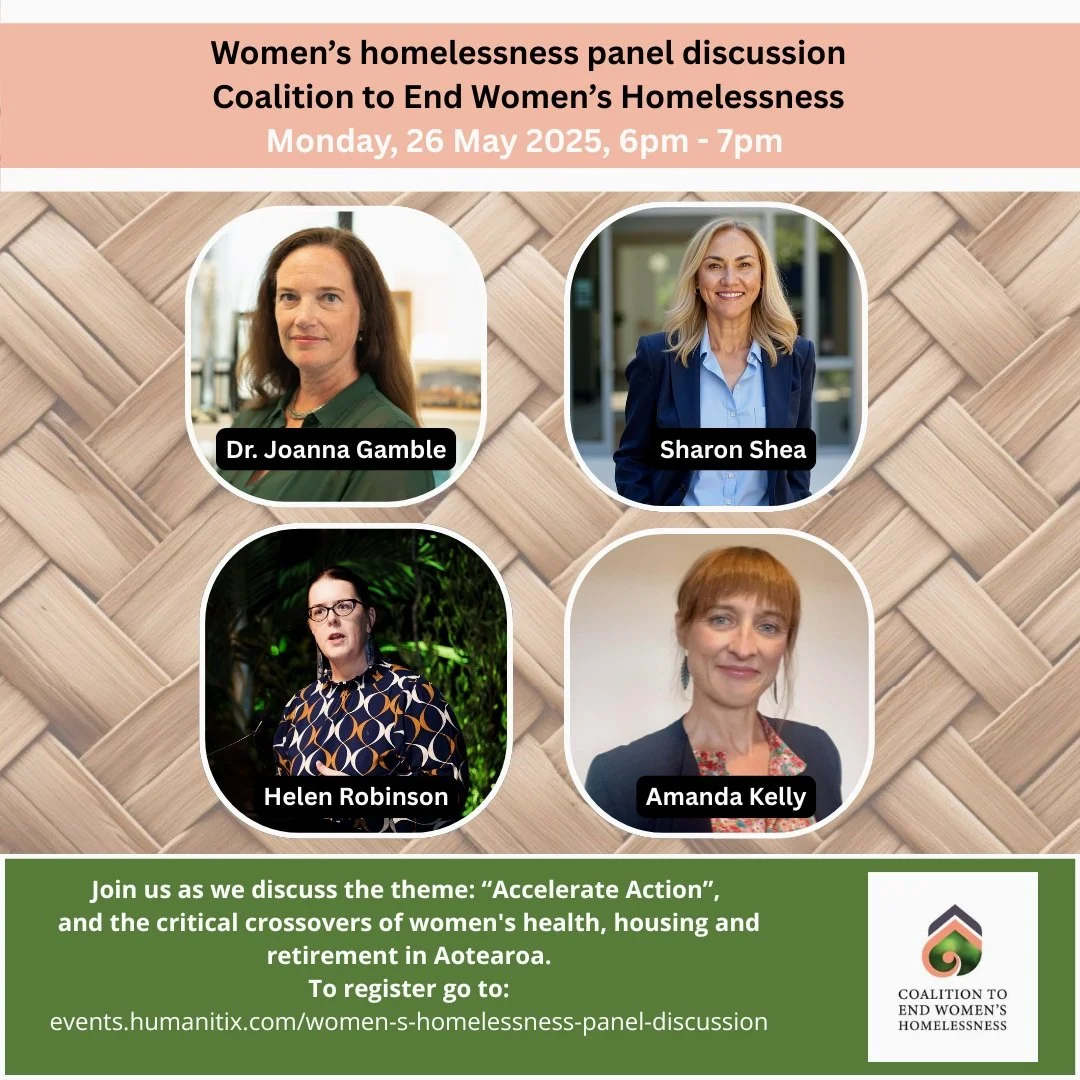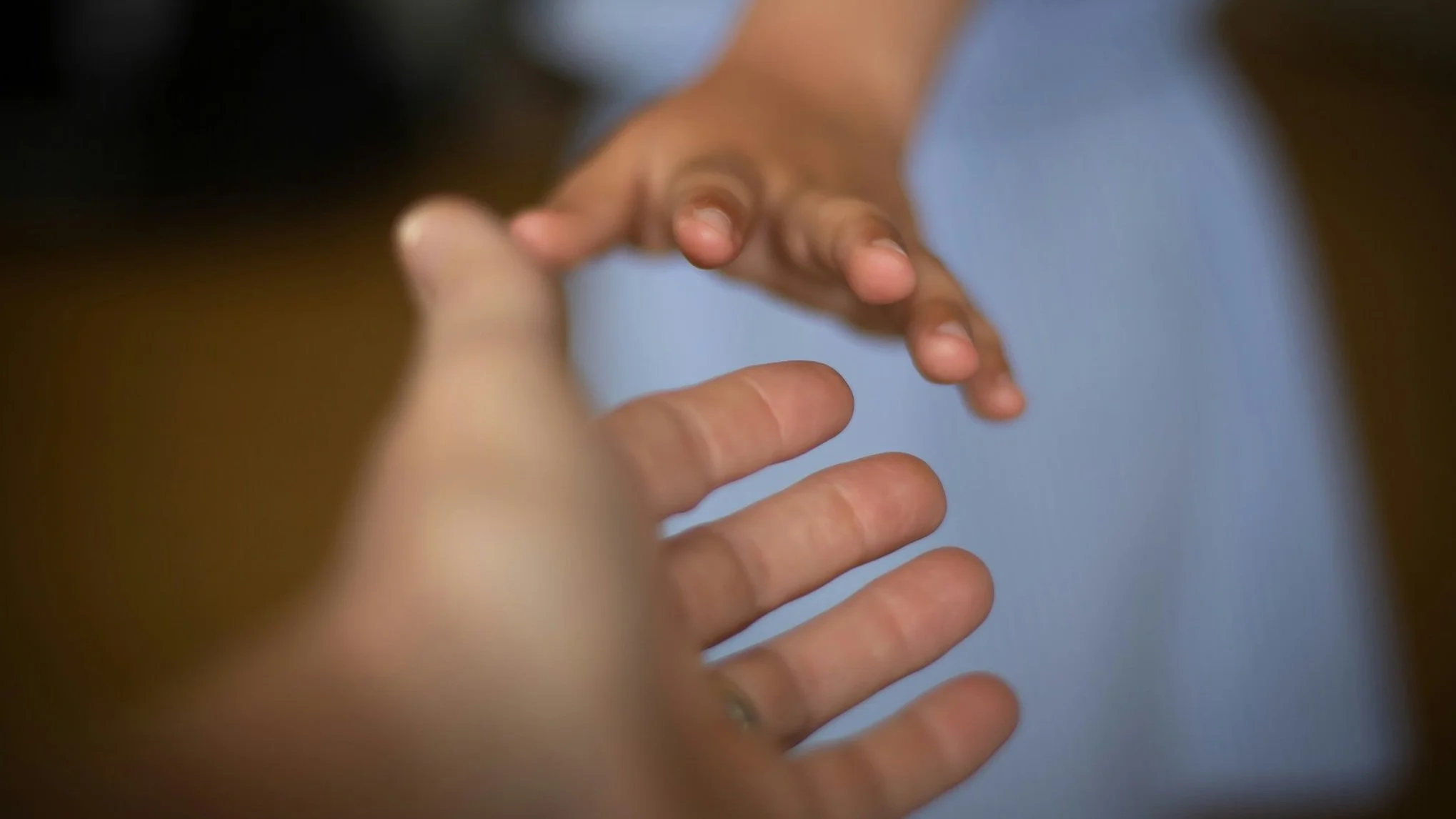May 2025 pānui
Kia ora,
In May, we’re focused on an urgent and often overlooked reality: the deep and complex connections between women’s health, housing, and retirement.
For many women across Aotearoa, these three areas are inseparable, and yet, our systems often treat them in isolation. A lack of safe, stable housing can take a toll on physical and mental health. Chronic health challenges can make it harder to stay housed or plan for retirement. And for older women, especially those with limited financial security or support networks, the risk of homelessness increases.
On Monday 26th of May, we are hosting a discussion panel which will highlight these critical intersections, stories, insights, and actions that show why we must design policies and services that recognise the full picture of homeless women’s lives.
Join Sharon Shea MNZM , Helen Robinson, Joanna Gamble and facilitator Amanda Kelly as we discuss the crossovers of women’s health, housing and retirement.
Hear from Kaupapa Māori public health specialist, Sharon Shea, who says she would like to see every mokopuna in Aotearoa flourishing.
"As a proud New Zealander and a proud indigenous woman, I would like to see every mokopuna in Aotearoa New Zealand flourishing, thriving, and realising the rangatiratanga they were born with. Persistent, unfair, and unjust inequities are an anathema to mokopuna oranga and the fabric of New Zealand’s society," Sharon says.
Dr. Jo Gamble will share insights on financial well-being; acknowledging that many older adults do not experience the 'Golden Years' they deserve.
“Things can happen over the course of a person’s life to derail plans they might have for their later lives. Their stories have ignited my passion for sharing such insights to foster significant change and ensure people are adequately supported in their retirement years,” she says.
Helen Robinson, Manutaki at Auckland City Mission – Te Tāpui Atawhai, has dedicated over a decade to advocating for a more equitable Aotearoa. She will speak to the findings of CEWH’s groundbreaking research report, Ngā Ara ki te Kāinga: Understanding Barriers and Solutions to Women’s Homelessness, which calls for urgent government action to address the systemic barriers preventing women from accessing safe, stable housing.
This kōrero is more than a discussion, it’s a call to action. We invite you to be part of this conversation, to listen, learn, and advocate for systems that honour the rights of all women today, and for generations to come.
Find out more about the event in our news section below.
Please help us spread the word and keep up momentum by encouraging others to sign up for our newsletter and follow us on LinkedIn.
Nāku noa,
Victoria Crockford
Project Director, Coalition to End Women’s Homelessness
NEWS AND VIEWS
Women’s Homelessness panel discussion, Monday 26 May
International Women’s Day has long been a catalyst for change — and this year’s theme, Accelerate Action, reminds us that momentum must continue beyond a single day.
Event location
This free event is being held at Auckland City Mission - Te Tāpui Atawhai, HomeGround, 140 Hobson Street, Auckland Central and online.
Please note that general admission tickets to attend in Auckland have sold out, but you can join the waiting list. You can still register to join online.
Time and date
Monday, 26 May 2025
6pm-7pm
To register
Visit our website here
Or visit
https://events.humanitix.com/women-s-homelessness-panel-discussion
For more information
Contact admin@cewh.org
Developing a Gender Analysis Tool from a Te Ao Māori lens
We are excited to announce our collaboration with Kathie Irwin and Associates to develop a Gender Analysis Tool from a Te Ao Māori perspective. This tool is designed to support and strengthen our work, as well as the efforts of others in the sector, in addressing the complex issue of women’s homelessness.
This innovative toolkit will include an analysis of existing research on women’s homelessness, with a particular focus on identifying key gaps in current knowledge. It will also present conceptual frameworks that underpin the tool, ensuring it is relevant to the lived experiences of women facing homelessness. Additionally, the toolkit will provide practical insights on how it can be used to better inform policies and practices that are culturally sensitive and effective in supporting women, particularly those from Māori communities.
Thank you to Kathie who has provided us with a sneak peak of her work. Stay tuned for updates on this important mahi as we move to the pilot phase.
Budget 2025: why ending women’s homelessness is key to ending child poverty
New blog from CEWH Director Victoria Crockford explores the critical connection between child poverty and women’s housing insecurity
We join Chief Children’s Commissioner Dr Claire Achmad in calling for urgent action on child poverty.
Our research shows many women experiencing homelessness are mothers, and when women live in poverty, so do their children.
17% of severely housing-deprived women receive Sole Parent Support, compared to just 5% in stable housing. Too many tamariki are growing up in cars, garages, and motels.
When we house women, we protect children.
As Budget 2025 approaches, we’re calling for:
policies that centre children and caregivers
real investment in safe housing for women
gender-informed social investment
In her latest blog, CEWH Director Victoria Crockford responds to the latest child poverty stats, highlighting how gendered housing insecurity, especially for single mothers, is missing from the conversation. She calls for a Women’s Homelessness Strategy and gender-responsive housing and welfare policy.
New transitional housing in Sydney supports women in recovery
In Sydney, new transitional housing is providing a lifeline for women recovering from addiction, trauma, and homelessness. Step Out House, developed in partnership with Detour House and supported by a government grant, offers up to 12 months of safe, stable accommodation for women, including trans and non-binary individuals, as they work towards long-term recovery and independence.
The initiative addresses a critical gap in support for women, especially those exiting domestic violence or facing housing insecurity, by combining housing with trauma-informed care.
The Women’s Agenda article which you can read here, follows Lauren’s story. Lauren was once homeless and is now a volunteer.
“Because I’ve been through it all myself for quite a few years, I love giving back to the new ladies to let them know there’s a light at the end of the tunnel,” says Lauren.
Support City Missions and foodbanks across Aotearoa with Family2Family
The Family2Family appeal is back, helping to provide essential food support to individuals and families across Aotearoa this winter. In partnership with New World, the campaign supports City Missions and foodbanks by encouraging customers to donate $20 pre-filled grocery bags or fill their own with non-perishable items. With food insecurity rising and winter approaching, every contribution makes a meaningful impact.
“We’re incredibly grateful to New World for … making a generous $250,000 donation to City Missions and local food banks. This funding helps us meet the increasing need for food support, social services, and wraparound care through the coldest and hardest months of the year”- Auckland City Mission- Te Tāpui Atawhai
Find out more here.
POLICY AND POLITICAL INSIGHTS
Part of MSD programme to prevent people ending up in emergency housing scrapped
The government has scrapped the first phase of a key Ministry of Social Development (MSD) programme designed to prevent people from entering emergency housing, citing staff shortages and pressure from other priorities, such as changes to the Jobseeker benefit. Phase one focused on identifying improvements within MSD to help people stay in stable housing, but officials said they were too stretched to continue. Feedback gathered before the phase was halted highlighted that the root causes of emergency housing needs often lie in systemic failures, like poor coordination between MSD, health services, and Corrections, rather than individual circumstances.
This move raises concerns, especially for women, who are disproportionately impacted by homelessness and often face compounded barriers, such as domestic violence, single parenthood, and limited income. Although a more holistic phase two is still planned, the delay leaves a gap in proactive, preventative support at a time when housing insecurity remains critical.
Read and listen to the RNZ story here.
He iti te mokoroa, nāna i kati te kahikatea
The grub may be small, but it cuts through the kahikatea
Vic, Helen, Jo, Caroline, and Jill






